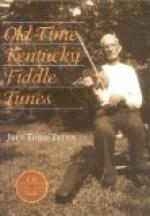“Oh, he likes it, here, as I have said,” she answered.
“But it is so—uncouth” said Barbara, plainly for the benefit of one or two admiring youths from the surveying party, who were standing near. “And some of the people look so absolutely vicious—some of the natives, I mean, of course, you know. Now look at that young fellow, over there!”
The girl had nodded toward Joe Lorey, who was standing not far off, observing them with an unwavering and disapproving, almost definitely hostile stare.
“He looks,” the girl went on, “as if he hated us and would be glad to do us harm. So violent!”
“He’s from up the mountains,” one of the young engineers said, glancing toward him. “It’s funny how those mountain people all hate us. You see, they say, the hills around about here are all full of moonshiners and they believe the coming of the railroad will bring with it law and order and that when that comes, of course, their living will be gone.”
“Moonshiners?” said Barbara. “Pray, what are moonshiners?”
Her father grimly smiled again. He knew that she knew quite as well what moonshiners were as any person in the group, but her affected ignorance of rough things and rough men amused him.
“Distillers of corn whisky who refuse to pay their taxes to the government,” the youth replied. “The revenue officials have had dreadful times with them, here in the Cumberland, for years. Sometimes they have really bloody battles with them, when they try to make a raid.”
“How terrible!” said Barbara, and shuddered carefully. She looked again at Lorey, who, conscious that he was the subject of their conversation and resentful of it, stared back boldly and defiantly. “And do you think that he—that very young man there—can possibly have ever actually killed a man?”
The engineer laughed heartily. “That he may possibly have killed a man,” said he, “there is no doubt. I don’t know that he has, however, and it is most improbable. I don’t even know that he’s a moonshiner.”
Among the others who had left the train, which, now, had been switched off to a crude side-track, the cars left there and the locomotive started at the handling of dirt-dump-cars, were two tall, sunburned strangers, whom Miss Alathea, who had noted them as she did everyone, had classed as engineers or surveyors, but who had not, when they had arrived, mingled with the other men employed on the construction of the railroad. While the young man and Barbara were talking about moonshiners, one of them had drifted near and he gave them a keen glance at the first mention of the word. Now he turned, but turned most casually, to follow with his own, their glances at Joe Lorey. Then he sauntered off, and, as he passed Holton, seemed to exchange meaning glances with him.




